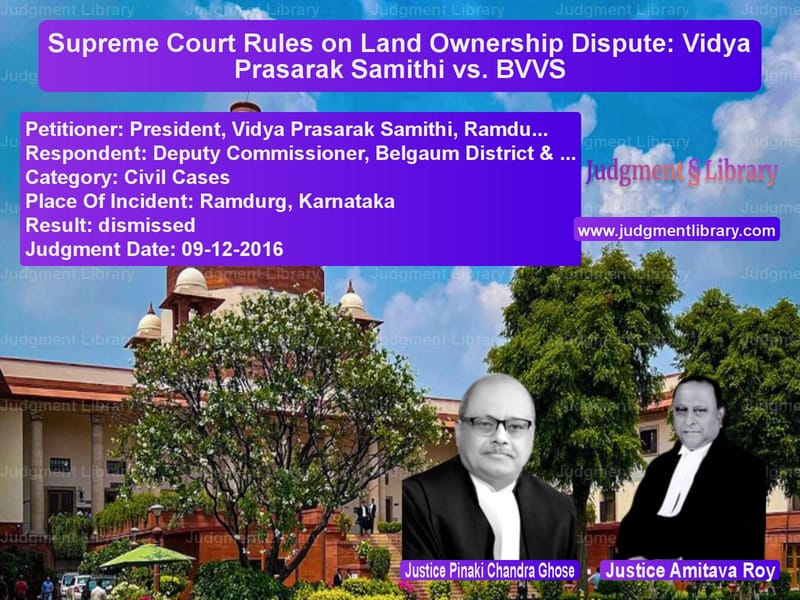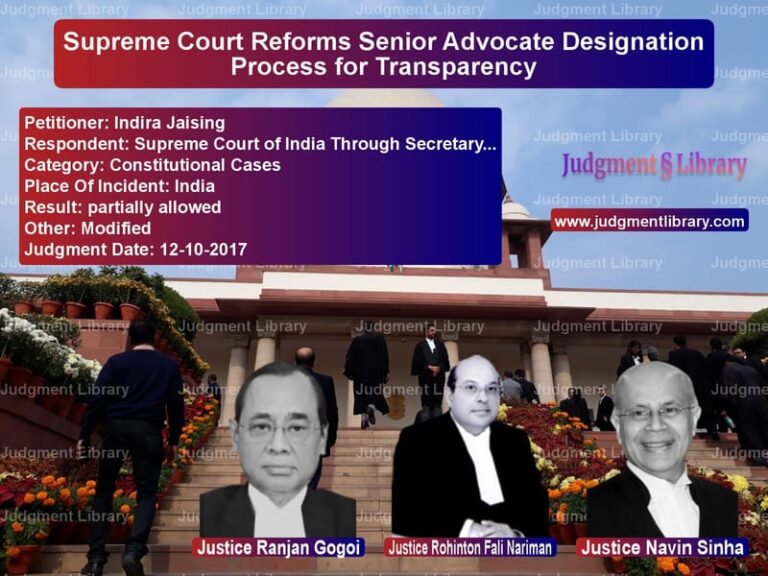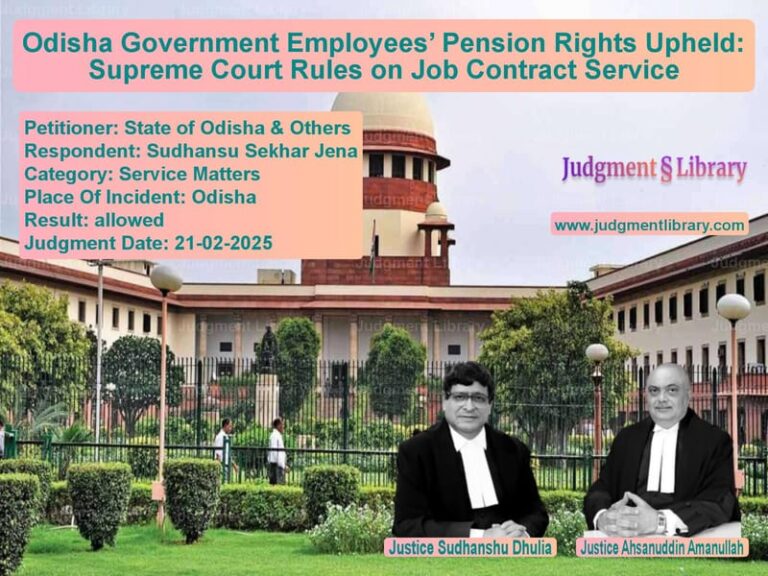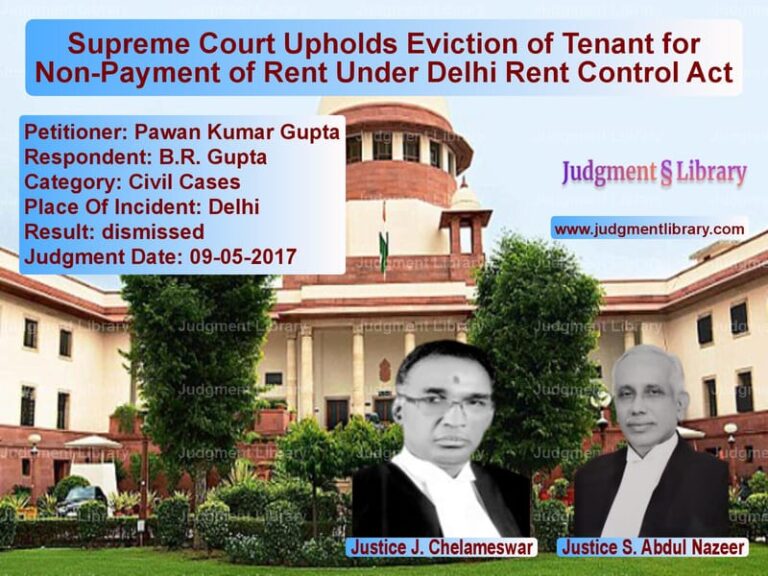Supreme Court Rules on Land Ownership Dispute: Vidya Prasarak Samithi vs. BVVS
Land disputes, especially those involving government land grants, often lead to long legal battles. One such case is President, Vidya Prasarak Samithi, Ramdurg vs. Deputy Commissioner, Belgaum District & Ors., which was decided by the Supreme Court on December 9, 2016. The case revolved around the ownership of a government-owned plot of land that two educational institutions—Vidya Prasarak Samithi (VPS) and Basaveshwar Vidya Vardhak Sangha (BVVS)—claimed for their students’ playground. The dispute raised important legal questions about the validity of government land grants and the authority of administrative bodies to allocate land.
Background of the Case
The land in question, CTS No. 1674/1, was originally government land in Ramdurg, Karnataka. The issue began in 1970 when the Assistant Commissioner of Belgaum granted the land to Vidya Prasarak Samithi for use as a playground. However, BVVS challenged this decision, claiming that the land had already been allotted to them in 1966. This dispute led to multiple appeals before the Deputy Commissioner, the Karnataka Appellate Tribunal, and the High Court.
Over the years, both institutions continued to use the land, leading to further conflicts and legal battles. The Karnataka High Court ruled in favor of BVVS, stating that the land grant to VPS was illegal. VPS then appealed to the Supreme Court, arguing that they were the rightful owners based on the Assistant Commissioner’s original grant.
Legal Issues in Question
- Was the Assistant Commissioner’s grant of land to VPS legally valid?
- Did BVVS have a pre-existing legal claim over the land?
- Was the Karnataka High Court correct in overturning the Assistant Commissioner’s decision?
- What principles should be followed when allocating government land?
Petitioner’s (Vidya Prasarak Samithi) Arguments
- The land was legally granted to them by the Assistant Commissioner in 1970.
- BVVS had no rightful claim over the land since they had acquired a separate plot for their playground.
- The Deputy Commissioner upheld the grant, and the High Court should not have interfered with the administrative decision.
- Students of VPS had been using the land for several decades, and their rights should be protected.
Respondent’s (BVVS) Arguments
- The land originally belonged to a government school that had been transferred to BVVS in 1966.
- BVVS had paid the full market value for the land, making them the rightful owners.
- The land was not available for fresh allotment in 1970, and the Assistant Commissioner’s grant to VPS was illegal.
- The Karnataka High Court’s decision to reverse the grant was legally sound and should be upheld.
Supreme Court’s Judgment
The Supreme Court, comprising Justice Pinaki Chandra Ghose and Justice Amitava Roy, ruled in favor of BVVS, making the following key observations:
- The land had already been transferred to BVVS, which had paid the full market value.
- The Karnataka High Court was correct in overturning the Assistant Commissioner’s decision.
- The land was never available for a fresh grant, and VPS’s claim was legally invalid.
- The Division Bench of the Karnataka High Court had correctly confirmed BVVS as the rightful owner.
Analysis of the Judgment
The ruling clarifies several important legal principles regarding land ownership and administrative authority:
- Pre-existing Ownership Rights: If an institution has legally acquired land, it cannot be reallocated by administrative authorities.
- Judicial Review of Government Actions: Courts have the power to overturn erroneous administrative decisions.
- Market Value Payment Establishes Ownership: Payment of market value strengthens legal claims to land ownership.
- Fair Use of Public Land: Government land grants must be carefully reviewed to avoid legal conflicts.
Impact of the Judgment
This ruling has significant implications for educational institutions and government land allocations:
- It reinforces the importance of adhering to legal procedures in land grants.
- It prevents future disputes by setting a precedent on land ownership rights.
- It ensures that courts can intervene to correct administrative errors.
Conclusion
The Supreme Court’s judgment in Vidya Prasarak Samithi vs. BVVS reinforces the principle that government land grants must align with existing ownership records and legal procedures. By upholding BVVS’s ownership rights, the Court ensured that land already allocated cannot be reallocated arbitrarily. This ruling sets an important precedent for future land dispute cases in India.
Don’t miss out on the full details! Download the complete judgment in PDF format below and gain valuable insights instantly!
Download Judgment: President, Vidya Pra vs Deputy Commissioner, Supreme Court of India Judgment Dated 09-12-2016.pdf
Direct Downlaod Judgment: Direct downlaod this Judgment
See all petitions in Property Disputes
See all petitions in Judgment by Pinaki Chandra Ghose
See all petitions in Judgment by Amitava Roy
See all petitions in dismissed
See all petitions in supreme court of India judgments December 2016
See all petitions in 2016 judgments
See all posts in Civil Cases Category
See all allowed petitions in Civil Cases Category
See all Dismissed petitions in Civil Cases Category
See all partially allowed petitions in Civil Cases Category







